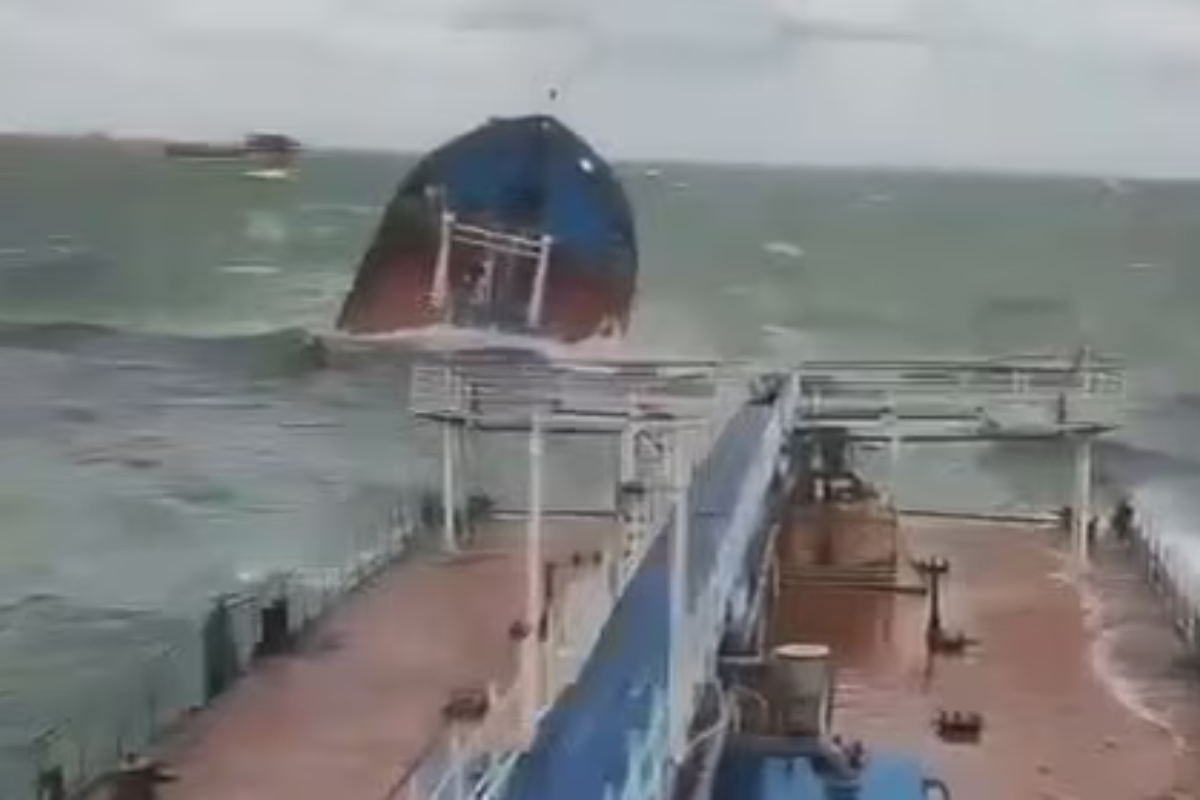The Black Sea is facing an environmental crisis after two Russian oil tankers sank in the Kerch Strait on December 15, 2024. The accident caused a massive oil spill, releasing thousands of tonnes of fuel oil into the sea. This is the latest ecological catastrophe for a region already suffering from war and environmental damage.
Massive oil spill threatens Black Sea
The Volgoneft-212 and Volgoneft-239 tankers, operated by Russian company Volgotanker, carried 9,200 tonnes of fuel oil. Severe weather caused the 55-year-old Volgoneft-212 to split in half, spilling low-grade heavy fuel oil destined for the Russian navy. The second vessel, Volgoneft-239, was also damaged and ran aground due to powerful winds and high waves.
Russian state media TASS confirmed at least one crew member aboard Volgoneft-212 died in the accident, while others were rescued. The Russian Ministry of Civil Defence deployed helicopters, tugboats, and over 50 personnel for rescue and cleanup efforts.
The oil spill threatens the Black Sea‘s marine ecosystem. Greenpeace warned that the heavy fuel oil could cause long-lasting damage to marine life and coastal habitats. Paul Johnston, head of Greenpeace Research Laboratories, told BBC News that if the oil reaches the shore, it will contaminate the coastline, making cleanup extremely challenging.
The Kerch Strait connects the Black Sea and Azov Sea, a vital route for transporting oil, gas, and other resources. However, it also hosts a delicate marine ecosystem. This area has experienced oil spills, including a major 2007 incident when a tanker spilled over 1,300 tonnes of oil, damaging marine life, polluting coastlines, and taking years to clean up.
Russia blamed for reckless negligence
Environmentalists and Ukrainian officials have criticised Russia for operating aging tankers in dangerous weather conditions. Dmytro Pletenchuk, Ukraine’s navy spokesperson, called the incident “reckless” and accused Russia of negligence. He highlighted that both tankers involved in the accident were over 50 years old and not properly maintained.
Russia’s President Vladimir Putin has ordered a working group to address the crisis and contain the spill. However, Ukrainian officials remain skeptical, accusing Russia of prioritising oil transport over safety. According to The Guardian, Ukraine blamed the deteriorating condition of Russian vessels for the incident.
Since the Kremlin invaded Ukraine in 2022, Russia’s oil exports have faced heavy sanctions from Ukraine’s allies. To bypass these restrictions, Russia has been accused by BBC News of operating a “ghost fleet” of poorly maintained and underinsured tankers. These ships often turn off their tracking systems to avoid detection while transferring oil.
Reports suggest the tankers involved in this recent spill do not belong to the ghost fleet. Instead, they are part of Russia’s older fleet of tankers, still used despite safety concerns.
War worsens Black Sea pollution crisis
The Black Sea has suffered significant environmental damage since the 2022 war. Military activities, underwater explosions, and infrastructure destruction have polluted the waters and disrupted marine life. Scientists have recorded alarming declines in dolphin, mollusk, and crustacean populations.
The latest spill will compound these problems. If the damaged tankers continue to leak oil, the pollution could persist for months or years. Experts fear irreversible damage to marine habitats. CNN reported Greenpeace Ukraine’s concerns about containing the spill in the area’s severe weather.
The current incident echoes the 2007 Kerch Strait oil spill caused by a severe storm. Several ships sank, spilling over 1,300 tonnes of oil. The pollution destroyed coastal habitats, affected thousands of birds and marine animals, and cost local industries millions.
Paul Johnston from Greenpeace emphasised the priority is to minimise further spillage. If the tankers sink completely, the oil and petrochemicals could leak slowly over time, worsening the damage.
Environmental organisations and international experts urge swift action to contain the spill. Cleanup efforts will require significant resources, and weather conditions could complicate the process.
This incident highlights the environmental risks of ageing vessels and inadequate safety measures. It underscores the need for stronger international regulations for safer maritime transport in ecologically sensitive regions like the Black Sea.
Support us to keep independent environmental journalism alive in India.
Keep Reading
Watch: Kashmir experiences first snowfall of season after dry spell
Amarnath Yatra: Tackling rising death toll from extreme weather events
Tourists arrival in Kashmir break records, a need to regulate it?
From tourist paradise to waste wasteland: Sindh River Cry for help
Follow Ground Report on X, Instagram and Facebook for environmental and underreported stories from the margins. Give us feedback on our email id greport2018@gmail.com.
Don’t forget to Subscribe to our weekly newsletter, Join our community on WhatsApp, and Follow our YouTube Channel for video stories.






